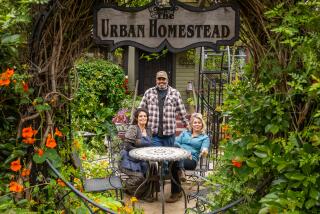Farm Haven of Disabled Pleases Residents but Raises Concerns : Mental health: Some experts say itâs a throwback to insane asylums. To others, a communal farm is a welcome alternative to the usual programs.
EASTMANVILLE, Mich. â Sidney and Donna VanderTuin have worried about the future of their son, Mark, since he suffered brain damage in a fall at the age of 18 months.
Mark, left with the mental capacity of a 7-year-old, spent most of his 37 years on the familyâs Kent County farm. As the VanderTuins aged, they wondered what would happen to him when they were no longer able to care for him.
âAll we wanted was for him to be in a good, safe place if something happened to us,â his father said. âAnd, of course, we wanted him to be happy.â
In 1988, they found Community Haven.
The 265-acre farm, about 25 miles northwest of Grand Rapids, is under the auspices of the Ottawa County Department of Social Services, but is run by the 60 handicapped and elderly people who live there. It is one of several such programs--not without critics--across the nation.
âI donât remember ever seeing Mark this happy. Itâs the best thing we ever did, for us and for him,â said Sidney VanderTuin, now retired and living in Wayland.
On an unusually warm winterâs afternoon, Mark, a lanky man clad in a green sweat shirt, jeans and waders, is out feeding the chickens, a job he said he likes almost as much as milking the cows at 4:30 a.m.
His speech is unclear--he didnât speak at all for the first seven years of his life--but he picks up one of the chickens and mumbles some soothing words as he smoothes its feathers. Asked if he is happy, he nods enthusiastically.
Everyone at Community Haven has a job, according to each individualâs interests and abilities, said former director Jonathan Rager, who resigned in January to supervise an emergency shelter for children in Muskegon. He said his resignation didnât have anything to do with a controversy surrounding the farm. He just wanted to return to his old job working with troubled kids.
Some residents at Community Haven tend to the 120 cows that graze on the rolling pasture behind the big red barn. Others wash and package eggs at the government-approved egg-grading station on the site. Some work in the kitchen, laundry or greenhouse, or with the puppies they help train as guide dogs for the blind.
Then there are the country store, where residents work and spend most of their small paychecks, and the breeding room, where they raise parakeets for sale to pet shops.
Many of the residents grew up on farms. While some are in wheelchairs and others suffer from crippling diseases, all residents must be ambulatory to live here. There is a full-time nursing staff and a doctor always on call.
âEveryone has a chore,â said Rager, a burly, bearded man with a gentle voice and easy smile. âSome people may only be able to ring the dinner bell. Thatâs OK too.â
Yet some mental health advocates say Community Haven and similar facilities across the country are not OK.
They say Community Haven represents a throwback to the days of institutionalization and is at odds with efforts to integrate the disabled into the mainstream.
âHistorically, it is a great step backward,â said Jim Knoll, a researcher at the Disabilities Institute of Wayne State University in Detroit. âLumping everyone together in an isolated setting is a concept rooted firmly in the 19th Century.â
Since the 1960s, when horrific patterns of abuse and neglect were exposed at overcrowded institutions and hospitals, the trend has been to shut down those facilities and develop support systems so the disabled can live, and perhaps work, in their communities.
There have been some success stories, but recent research shows that such services have been woefully inadequate and have left many mentally impaired citizens homeless and incarcerated. Still, many mental health advocates cringe when they hear about facilities with more than a few people living under one roof.
Residents at Community Haven live two to a room in a single-story building whose long, green carpeted corridors resemble those of an older nursing home.
âWhen I hear people say, âLetâs take a nice, remote area with a bunch of land and put these people out there, where society canât hurt them, thatâs when I worry,â said Elizabeth Bauer, executive director of Michigan Protection and Advocacy Service in Lansing. âItâs the asylum movement all over again.â
Gerald Friedman, executive director of Lambs Farm in Libertyville, Ill., has heard similar criticism.
About 150 mentally retarded residents live and work on the 63-acre farm north of Chicago in a variety of businesses. The farm has a pet shop, restaurant, silk-screening shop and ice cream parlor. About 300,000 people visit each year, and Friedman said the farm has an excellent reputation.
âThe greatest problem in our field is that somebody else always seems to know better how somebody else should live,â Friedman said. âTo suggest a model be created in which everyone needs to fit is ridiculous. It all boils down to a quality of life.â
Community Haven, which was used as a shelter for the poor in the late 19th and early 20th centuries, always has had its share of critics. And the county, which this year will pay about $640,000 to operate the facility, has come close to shutting it down more than once, primarily for financial reasons.
Instead, the county now is considering plans to add diverse vocational training to prepare residents and non-residents for competitive employment. It also may create some on-site businesses, such as a restaurant, pet shop or bookstore, for residents to get on-the-job experience and more contact with the public.
Rager said his goal is the same as his criticsâ: to prepare the disabled to live in the least restrictive environment possible. Most residents stay for years. Some eventually find outside employment and move into apartments of their own.
Critics say you canât prepare someone to live in society by keeping them on a farm.
âI was invited to bring my Girl Scout troop out for a tour,â said Cindy Burkhour of Jenison, a representative of the Assn. of Retarded Citizens. âThey call this a home, but I donât give tours of my home. How about you?â
In addition to the tours, residents of Community Haven participate in outside community education classes, church events, once-a-week bowling and frequent outings to movies, restaurants and stores.
Haven residents âprobably have more contact with the public than those folks in these small group homes in the city,â Rager said.
He speaks from experience. Before coming to the Haven nearly four years ago, Rager worked at a state psychiatric facility and supervised two six-bed homes for the mentally retarded in Muskegon. He said that neighbors there kept their distance.
âJust because these people are living in the community doesnât necessarily mean thereâs interaction with the community,â Rager said. âSome of our residents have failed repeatedly in small group homes. They sat and watched TV. One person told me, âI sat around all day doing bead work. I was bored.â Here, if they get bored, we have a hayride.â
Critics say that as long as Community Haven exists--and especially if it grows--there will be no impetus for the county to explore other options.
The controversy has taken its toll on the residents and their families.
âMy brother told me the other day he didnât know where he was going to live,â said John vander Wall of Hudsonville, whose 66-year-old mentally retarded brother, Lester, has lived at Community Haven for 24 years.
âI think heâd curl up and die if he had to go into a nursing home.â
More to Read
Sign up for Essential California
The most important California stories and recommendations in your inbox every morning.
You may occasionally receive promotional content from the Los Angeles Times.










